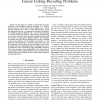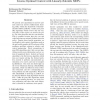116
click to vote
IJRR
2011
14 years 9 months ago
2011
We present a novel approach to legged locomotion over rough terrain that is thoroughly rooted in optimization. This approach relies on a hierarchy of fast, anytime algorithms to p...
145
click to vote
CORR
2011
Springer
14 years 9 months ago
2011
Springer
Modeling the behavior of imperfect agents from a small number of observations is a difficult, but important task. In the singleagent decision-theoretic setting, inverse optimal co...
158
click to vote
CORR
2011
Springer
14 years 9 months ago
2011
Springer
—In this paper we consider an interacting two-agent sequential decision-making problem consisting of a Markov source process, a causal encoder with feedback, and a causal decoder...
101
click to vote
CDC
2010
IEEE
14 years 9 months ago
2010
IEEE
In recent papers it has been suggested that human locomotion may be modeled as an inverse optimal control problem. In this paradigm, the trajectories are assumed to be solutions of...
124
click to vote
ICRA
2010
IEEE
15 years 19 days ago
2010
IEEE
— We present a novel approach to legged locomotion over rough terrain that is thoroughly rooted in optimization. This approach relies on a hierarchy of fast, anytime algorithms t...
126
click to vote
ICML
2010
IEEE
15 years 3 months ago
2010
IEEE
We present new algorithms for inverse optimal control (or inverse reinforcement learning, IRL) within the framework of linearlysolvable MDPs (LMDPs). Unlike most prior IRL algorit...


